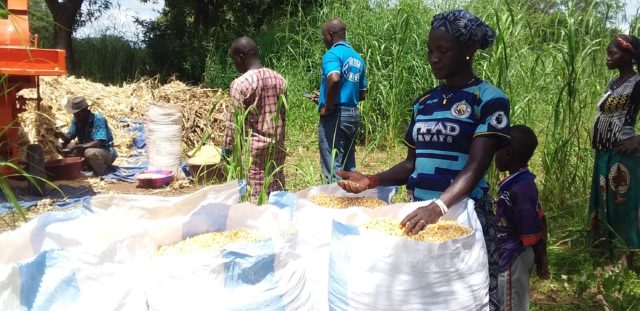Building Resilience: Malian Farmers Lead Their Own Development
Timothy Coulibaly is a maize, millet, and peanut producer in Farakala, Mali. In 2021, when Feed the Future Mali Sugu Yiriwa began to collaborate with his village, Coulibaly was selected to work as a community focal point, helping Sugu Yiriwa provide technical support to local farmers, producers, and entrepreneurs.
So far, Sugu Yiriwa has trained over 200 development leaders like Coulibaly to assist their communities in exchanging agricultural best practices in the Sikasso region. Through their training, these community champions elevate local voices, share knowledge with agricultural stakeholders, ensure that context-specific needs are addressed, and help develop locally-driven solutions.
In June 2022, Sugu Yiriwa hosted a training in Sikasso on conservation, cereal storage, and good sanitation practices for producing and handling dry cereals like millet, sorghum, rice, maize, cowpea, and by-products. The training highlighted the serious consequences that post-harvest losses can have across the grain supply chain, such as increased market prices, fewer livelihood opportunities, and negative health impacts. During this training, Coulibaly was introduced to multifunctional threshing machines and was able to see the equipment in action.

Given the poor capacity of threshing machines in Farakala and surrounding villages, Coulibaly realized that buying an axial thresher would be a great business opportunity that would fill a gap in his area by increasing productivity, revenue, and community resilience.
Reflecting on the machine’s potential, Coulibaly said: “In the past, 30 percent of our harvest was lost due to the lack of machines that could thresh the crops in a timely and efficient way. During the harvest season, producers were obliged to wait their turn for threshing and the results were not ideal. This exposed produce to animals and rain. If the produce was not stored well before threshing, farmers were at the mercy of mold and parasites that, in addition to being vectors of disease, have a negative impact on health and agricultural yields.”
At the end of the training, Coulibaly reached out to Sugu Yiriwa to help him buy a threshing machine for his community. “Sugu Yiriwa put us in touch with SOCAFON, a company based in Niono that manufactures agricultural equipment. Sugu Yiriwa field agents accompanied me throughout the process and helped me get a price reduction. Sugu Yiriwa also helped facilitate access to a loan of 2.5 million FCFA ($3,700), which covered both the purchase price and on-site training with the manufacturer’s technicians.”
Cereal crops are central to agriculture in the Farakala area and the new thresher provides great value-added for farmers, with a capacity of up to two tons of grain per hour. “In a single working day from 7 a.m. to 6 p.m., we can now thresh ten tons of grain, or 100 bags of 100 kg each,” Coulibaly said. “We provide threshing services for rice, maize, and sorghum farmers, and we have not stopped working since the arrival of the machine. Our work will continue until January, which is the end of the harvest season. I am currently working with my younger brother who is passionate and helps a lot.”

Operating the threshing machine costs between 7,500 FCFA ($11) and 10,000 FCFA ($15) per ton of maize, and between 12,500 FCFA ($19) and 15,000 FCFA ($22) per ton of rice. It operates at higher capacity and lower cost than the only other, old threshing machine in the area. Demand for Coulibaly’s threshing services is unrelenting. With the extra income he is now earning, he plans to repay his loan and buy another machine of the same type.
Sugu Yiriwa not only facilitates the acquisition of agricultural equipment, but also supports producers by offering training and advice to better manage their business and increase their profits. So far this year, two new threshing machines are up and running in Sikasso region thanks to Sugu Yiriwa and there are more to come.
Climate change has drastically reduced crop yields, lowered the nutritional quality of major cereals, and decreased livestock productivity in Sikasso. To cope with these impacts, Sugu Yiriwa promotes climate change adaptation initiatives designed to positively impact agricultural productivity in the grain sector, improve food security, and increase incomes and community resilience. This includes assisting local stakeholders, like Coulibaly, with the tools they need for more efficient harvesting and better storage, resulting in reduced effort and fewer products going to waste.


Recent Comments